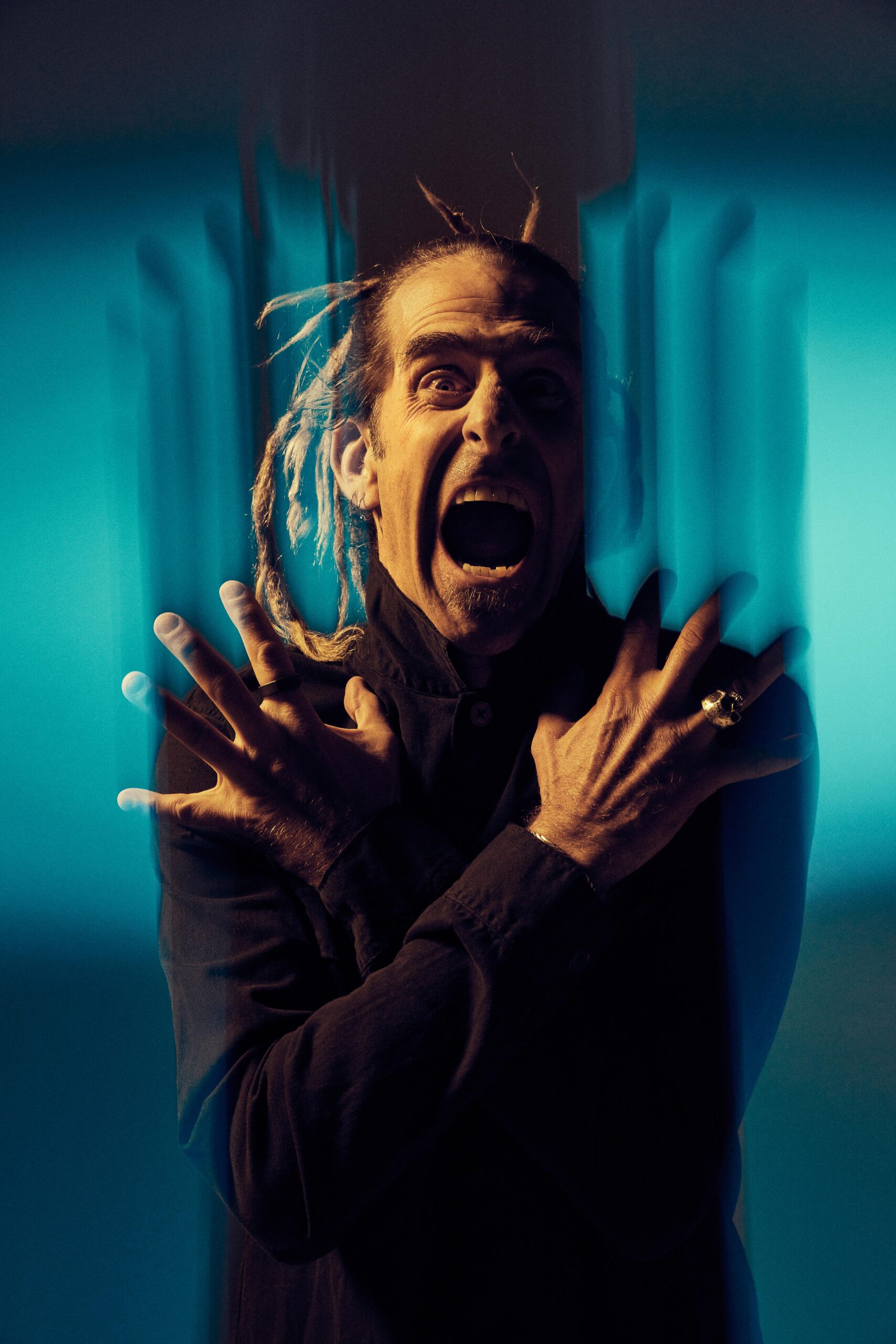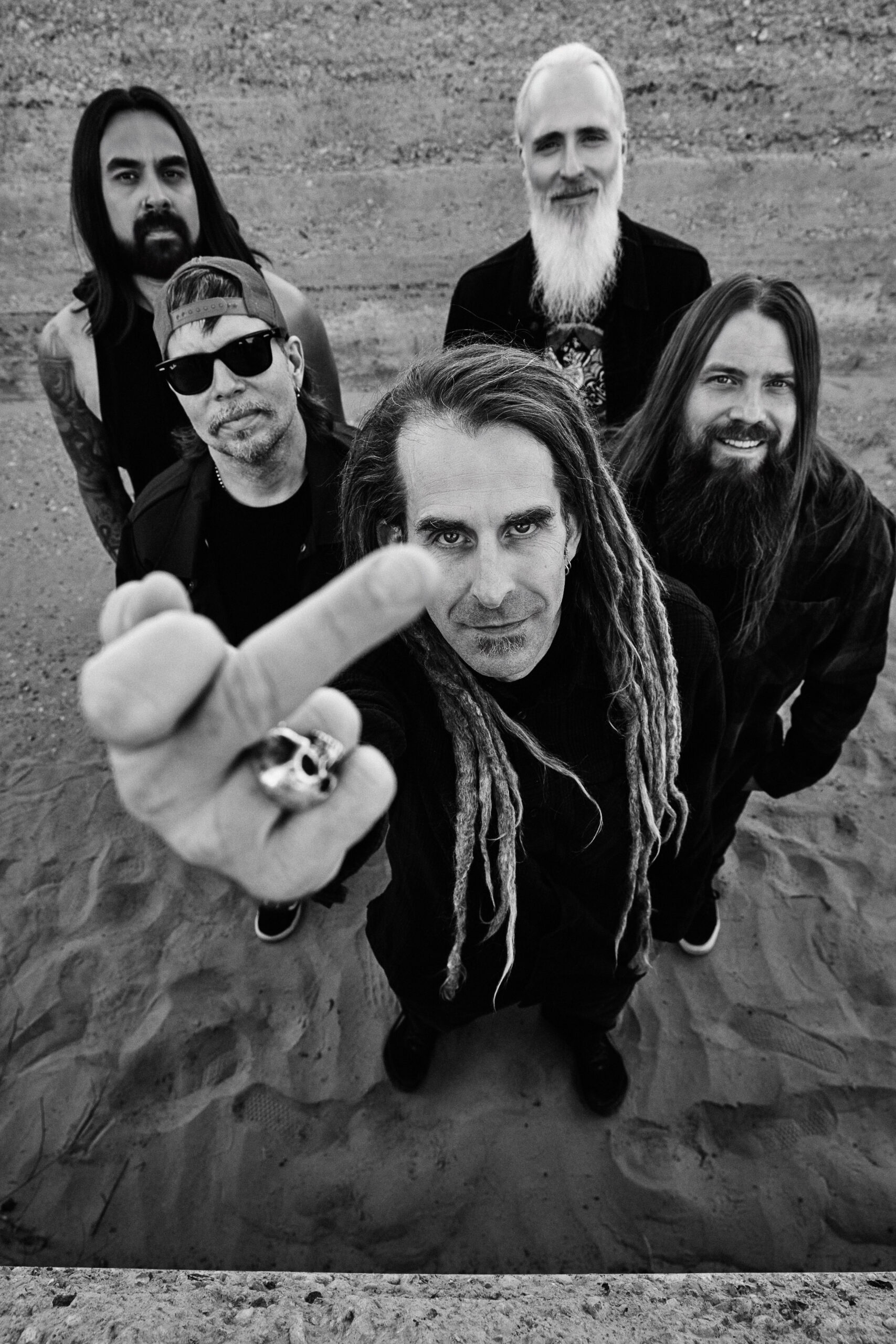Real talk? The cumulative weight of changing trends, the major-label system and cruel fate have all failed to cushion Lamb of God’s blunt-force velocity. Their latest, Omens (out on Oct 7), is a throttled-out, high-decibel jetstream with a series of cautionary tales and psychic explorations couched inside its 10 songs. Whether addressing ecological ruin, psychological anguish or detailing the more corrupt aspects of mankind, the band does it with the same physical and emotional fury they’ve thrown down on their eight previous releases.
Yet, for many years, frontman D. Randall Blythe was in a well-constructed, triple-riveted, state of denial when fans, critics and rock journalists tagged his band with the m-word.
“I never wanted to be in a metal band,” Blythe says over the phone from a hotel in Heidelberg, Germany, where Lamb of God is on the European festival circuit. “I’m not a metalhead. I don’t really listen to much metal. I listen to a lot of punk rock, industrial, old reggae and jazz. I never, ever thought I’d wind up in a metal band.
“Our bass player, John [Campbell] grew up in the D.C. area punk-rock scene and listened to a lot of the Dischord stuff,” Blythe continues. “And Willie [Adler], our guitar player, grew up listening to a lot of hardcore, as well as the metal. John said a long time ago, ‘We’re a punk rock band that plays metal.’ There was no metal scene as it exists today: We were playing squats in warehouses in West Philly and Baltimore with punk rock bands through my connections in the scene. For years, I was like ‘We’re not a metal band.’ But I am in a metal band. I’ve accepted that in my old age!”
Lamb of God — Blythe, Adler, Campbell, lead guitarist Mark Morten and drummer Art Cruz — are celebrated for acting upon their sonic attack impulses, gripping you by the throat or dropping you to your knees. But with Omens, they’re grabbing listeners by their prefrontal cortexes, shaking the metal faithful around to what the hell is going on as they blissfully mosh through the ruins of modern living.
While Omens definitely wins a “Truth in Advertising” award by virtue of its song titles, Lamb of God have tried to make things a little more opaque. Blythe and Morton write all of the lyrics, encapsulating everything including (but not limited to) “standard ‘fuck you’” diatribes, rude awakenings and failures of humanity. But if moments on Omens seem perfectly vague, well, there’s a reason for that.
“With this record, we’ve moved more and more away from saying, ‘This song is about this, this song is about that,’” Blythe says. “I can tell you with [2020’s self-titled LP], I made it publicly known that I did not want to write a record about Trump. Because a) out of spite, because fuck him, he doesn’t deserve a song, and b) everything changes so quickly with that dude, there’s no way to nail him down. It’s not like, you know, Reagan. There are so many songs about Reagan, but everything didn’t shift so rapidly with him. Oh, sure, he was a son of a bitch. Even like G.W. Bush, I cannot stand him. But a couple of good records came out of his own war criminal profiteering ways.”

It’s here where Blythe the artist reconciles with his enthusiastic fan side. Critics and metal diehards might scoff at Blythe for not taking stands on issues. (Because, like, metal is real, bro.) He counters the criticism with an anecdote of him performing with one of his favorite bands, American hardcore icons Bad Brains. He recalls hanging out with bassist Darryl Jenifer and asking him about the meaning behind “The Regulator” from their debut recording on the legendary ROIR cassette label.
“He told me, and it was not what I thought it was,” Blythe reveals. “Frankly, what I thought it was about in my mind is a lot cooler than what the song is actually about. Then he goes, ‘You know what, kid? I’m not going to tell you what any more of these songs are about, because you won’t sing them with the same passion.’
“That’s the cool thing about lyrics,” Blythe continues. “It’s our music. They’re my lyrics. But once you put it out there, they become part of someone else’s life. They become that person’s song, as well. And I don’t want to rob people of that experience.”
Listening to Blythe leaves an impression of a man who has accomplished and done a lot with himself — and not all of it was exemplary. During a 2010 show in the Czech Republic, Blythe was accused of killing a fan when security failures erupted into a stage invasion from members of the audience. Despite pleas from friends and business associates not to go back, Blythe returned to the country, spent five months in jail waiting for trial and was later acquitted by a high court ruling. (His telling of the incident was published in his book, Dark Days: A Memoir, released last year.) It’s important to note that while he has certainly seen some shit and endured it, Blythe doesn’t use his psychic scars like merit patches on an overgrown scoutmaster’s uniform. He genuinely wants to elevate metal’s codified value systems into something more useful to humanity than hedonism.
In 2017, Blythe traveled to North Dakota to stand in solidarity with the Native Americans of Standing Rock to protest the creation of the pipeline going through their land, endangering their ecological balance. The singer witnessed oppression and violence from law enforcement and private security firms hired to protect some corporate entities’ investments in the construction. Blythe documented the Natives’ struggles with his camera, and the photos appeared in a major magazine’s coverage of the standoff. Unknowingly, he also got a clandestine escort to the airport, when he and a friend were followed by police for the duration of the trip.
“We didn’t get hassled too much,” Blythe says. “Rollingcloud, my friend who is an Ojibwa/Anishinaabe tribal member from Minnesota, had some shit said to him in town. We were getting gas or something and I was away and someone was giving him dirty looks. But we were definitely followed for a long time by law enforcement when we left the place.” Blythe flew in from Minnesota thinking that had he would’ve flown out of North Dakota, he may have been creatively detained. “I didn’t know if we would get hassled trying to leave the place on an airplane or whatever. A lot of people had been arrested. There had been some pretty bad violence right before I got there.”

Two years later, while surfing the waves of Oak Island, North Carolina, Blythe met environmentalist Carlos Ojeda, who invited him to bring his board to Ecuador and check out the waves there. While the surfing was great, Blythe noted huge swathes of land destroyed from corporate over-farming. He and Ojeda pooled their resources and bought the land to revive it with local vegetation and return it back to its natural state. It was no problem for Blythe: Lamb of God would be back on tour and he would have the funds necessary to pay off the land. But because no good deed ever goes unpunished, the next year was the official beginning of the pandemic. Without any tour plans (even at the farthest horizon), Blythe was in a bad situation.
If modern living has taught us anything, it’s that principles only mean something when you stick to them at the most inconvenient time. While Blythe finds social media “problematic,” he was approached by the people at Cameo, the service that allows consumers to buy pre-recorded video messages to friends and family for whatever reason. Blythe signed up for the program, recording plenty of metallic birthday wishes and whatnot for a bevy of LoG fans. He soon had enough money to create an expenditure for restoring the land and paying people to maintain it. That prompted him to create a micro-documentary, Rewilding, which examines the land in Ecuador, what was done to it, how he and the Ojeda family have been redressing the balance and thanking everyone who asked him to record a Cameo clip.
“Cameo had been after me for a while,” he says. “And punk rock guilt kept me from doing it. I don’t think of myself as a rock star or a famous person or whatever. It’s just that’s not the way my mind works. I think I have a pretty good reputation of being an ethical stand-up dude. I didn’t think anyone was really going to bother. Like ‘I need specifics! What are you doing with this?’ But for me, I’m trying to be straight with people.
“So when I went back, I was like, ‘I’m going to make this short little documentary film and show people what I’ve spent their money on.’ I’ve almost broken even and money is still coming in and that’s enabled me to do other things because we have to do a lot of work still on my end. I did that film as a thank you to the people who work for Cameo, and also to show people ‘Look, you can do something.’ I realize not everybody is in my position. I’m hoping that someone will look at it and be like ’What sort of individual actions can I take that will be beneficial for our environment?’”
Studies in permaculture analysis and strident political protesting on indigenous lands may not be as “metal” as say, obtaining a 2023 Lamborghini or celebrating your birthday exclusively with employees at the Jack Daniels distillery. (Besides, how many metal bands has The Weather Channel covered anyway?) But Blythe (who is sober 12 years this month) has no need for empty vices or fuck-you-money flexing. That kind of humility, coupled with wild dynamics and a bone-snapping sonic assault, makes Lamb of God contenders for taking metal into a future where compassion and empathy are strengths worth acquiring (read: “That’s metal, dude”). But Blythe’s is an agenda that is solely his and not something he has foisted onto his bandmates or his fans. He will continue paying it forward in a world that doesn’t do that most of the time. And he’s alright with that, as well.
“Yeah,” he says. “Sometimes you just gotta have boots on the ground.”

Leave a comment